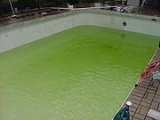
Chloramine
Overview
Inorganic compound
Inorganic compounds have traditionally been considered to be of inanimate, non-biological origin. In contrast, organic compounds have an explicit biological origin. However, over the past century, the classification of inorganic vs organic compounds has become less important to scientists,...
with the formula
Chemical formula
A chemical formula or molecular formula is a way of expressing information about the atoms that constitute a particular chemical compound....
NH2Cl. It is an unstable colourless liquid at its melting point of -66° temperature, but it is usually handled as a dilute aqueous solution where it is used as a disinfectant. The term chloramine also refers to a family of organic compound
Organic compound
An organic compound is any member of a large class of gaseous, liquid, or solid chemical compounds whose molecules contain carbon. For historical reasons discussed below, a few types of carbon-containing compounds such as carbides, carbonates, simple oxides of carbon, and cyanides, as well as the...
s with the formulas R2NCl and RNCl2 (R is an organic group).
Unanswered Questions

